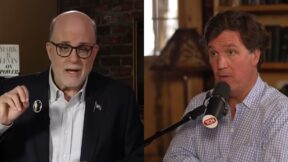Defense’s Own Expert Witness Admits that George Floyd Should Have Been Given ‘Immediate Medical Attention’
Jerry Blackwell, the prosecutor in the trial of former Minneapolis Police officer Derek Chauvin for the death of George Floyd, scored a major blow to the defense’s case on Wednesday during cross examination of the defense’s key medical expert witness, getting him to admit that Floyd should have been given immediate medical attention.
One of the crucial issues in the trial is whether Chauvin was reasonable in restraining Floyd by kneeling on him for 9 minutes and 29 seconds, including a period of time after Floyd had lost consciousness and then even after he had no pulse.
Among the witnesses for the prosecution was firefighter Genevieve Hansen, who was off-duty and happened to walk by the scene when Chauvin and the other officers were restraining Floyd. Hansen, who has been trained as an EMT, can be heard on the bystander videos begging the officers to check Floyd’s pulse. She also testified that she felt “totally distressed” and “helpless” that they would not let her render medical aid to Floyd.
Wednesday morning, defense attorney Eric Nelson began the examination of Dr. David Fowler, who recently retired after 17 years as Maryland’s chief medical examiner. Fowler presented several alternative theories for Floyd’s cause of death, including heart disease or carbon monoxide poisoning from the police car.
During cross-examination, Blackwell was able to get Fowler to clarify several of his claims, noting where he did not have data or a topic was outside of his area of expertise. In a key segment, Blackwell questioned Fowler extensively about the timeline of Floyd’s death, noting that his speech became slower, he lost consciousness, and then was found to not have a pulse.
Fowler explained that there was a difference between “death” and “cardiac arrest,” because cardiac arrest “is not absolutely irreversible and not synonymous with a person passing away.” Fowler said there was a period of time between Floyd’s cardiac arrest and actual death, noting that the official pronouncement was done at the hospital, but “frankly, he was dead long before that.”
“So, when we are in this space,” asked Blackwell, “where there is a space between cardiac arrest and the actual death, are you suggesting that though Mr. Floyd may have been in cardiac arrest, there was a time when he may have been revived because he wasn’t dead yet?”
“Immediate medical attention for a person who has gone into cardiac arrest may — may well reverse their process, yes,” replied Fowler.
“Do you feel Mr. Floyd should have been given immediate emergency attention to try to reverse the cardiac arrest?” asked Blackwell.
“As a physician, I would agree,” said Fowler.
“Are you critical of the fact that he wasn’t given immediate emergency care when he went into cardiac arrest?” asked Blackwell.
“As a physician, I would agree,” Fowler repeated.
Watch the video above, via CNN.
New: The Mediaite One-Sheet "Newsletter of Newsletters"
Your daily summary and analysis of what the many, many media newsletters are saying and reporting. Subscribe now!






Comments
↓ Scroll down for comments ↓